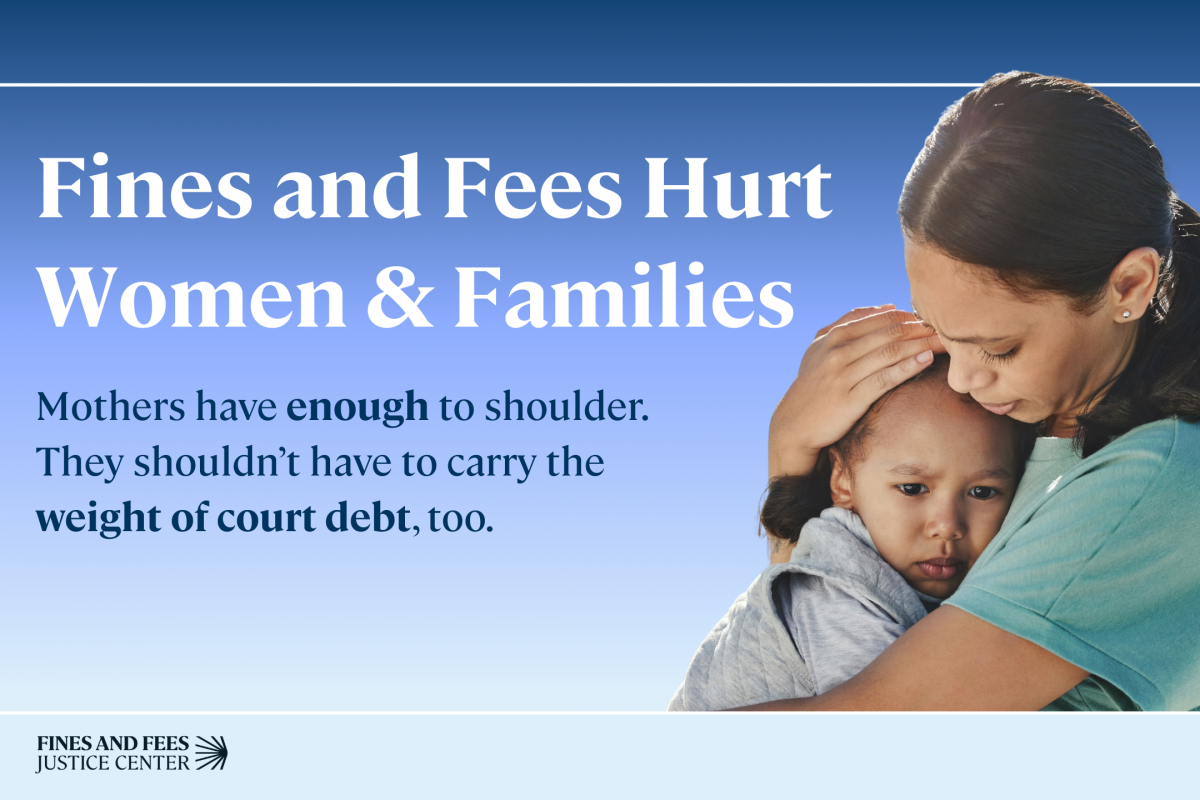While many of us shop for flowers or plan brunches for Mother’s Day, millions of moms across the country are carrying a weight that no one should have to bear: unjust court debt.
Fines and fees disproportionately harm women — particularly low-income women of color — by deepening poverty, destabilizing families, and prolonging entanglement with the criminal justice system. By exacerbating existing gender and racial disparities, these financial burdens force women to sacrifice basic necessities while navigating biased enforcement and collection practices.
Whether they’re navigating the criminal justice system themselves or supporting a loved one inside, women are being crushed under the weight of financial penalties that often last years —or even decades — beyond any sentence.
Want to understand how fines and fees uniquely impact women and mothers?
Explore our full research overview to see the data behind these disparities.
Women are disproportionately impacted by monetary sanctions
Fines and fees are disproportionately imposed on women. When women break the law, it tends to be for lower-level offenses that are more likely to result in monetary sanctions. Because fines are often associated with these kinds of low-level offenses, women are affected by fines at higher rates than justice impacted men. The harms related to unduly high or unpayable fines have a significant impact on women within the legal system.
And because women earn less and have more care giving responsibilities, monetary sanctions have a disproportionate impact when they are imposed on women. With a median income nearly $10,000 less than men, women have fewer resources to pay off fines and fees. Missed payments can lead to suspended driver’s licenses, extended probation or parole, or even incarceration. For mothers, this means separation from children, lost income, and deepening poverty. Financial punishment becomes family punishment.
Fines and fees jeopardize mothers’ ability to meet their families’ basic needs
According to a national survey, 99% of parents with court debt reported cutting back on food, housing, or other essential needs. That translates to 17 million children living in households that can’t afford basic necessities — all because of fines and fees. Mothers, often the sole caregivers, are forced to choose between keeping a roof over their heads and staying out of jail.
It blocks women from getting ahead
Fines and fees destabilize women’s lives long after sentencing. For those already earning less and carrying more caregiving duties, court debt means missed housing opportunities, job rejections, and credit damage. One study showed that women with criminal records saw their W-2 earnings drop three times more than men. That lost income impacts generations.
Women carry the burden of their loved ones’ debt
A study on the impact of incarceration costs found 83% of the family members primarily responsible for the fines and fees associated with conviction were women. Mothers, grandmothers, sisters, and daughters routinely go into debt to support loved ones behind bars, often at the expense of their own survival.
It exploits women’s roles as caregivers
According to the Bureau of Justice Statistics, nearly two thirds of incarcerated women are mothers of children under the age of 18. Often the sole caregiver to their children, mothers moving through the system face impossible decisions. Research from Oklahoma found that many women plead guilty — not because they are, but because it’s the fastest way to reunite with their children. Those guilty pleas result in hundreds or thousands of dollars in fines and fees. These financial penalties, combined with housing and employment barriers, can jeopardize their parental rights. The system exploits women’s caregiving roles, pushing them into decisions that undermine their long-term stability.
It creates long-term stress and instability
All debt is stressful, but court debt brings constant legal threats — like wage garnishment or jail time — that disproportionately affect women due to intersecting socioeconomic vulnerabilities. Many live in fear of re-incarceration or missing a payment. This kind of chronic legal stress compounds the emotional toll of poverty, caregiving, and criminalization, which can leave women feeling watched, punished, and trapped.
By eliminating harmful fees and ensuring that fines are equitably imposed and enforced, we can curb the long-term harm court debt inflicts on mothers, caregivers, and entire families.
To stay informed about the legislation we’re supporting across the country—and how you can help ensure that no mother is punished with a lifetime of debt, sign up for our newsletter.
Dig deeper into the data — use our research overview to understand how fines and fees disproportionately impact women, destabilize families, and deepen systemic inequities.
